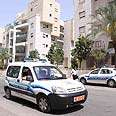
58% of religious public oppose questioning of rabbis
Joint Ynet-Yesodot survey addresses recent summoning of rabbis for police interrogation over their support of 'Torat Hamelech' book; reveals majority of religious, haredi public believe rabbinical establishment should enjoy religious freedom of debate
A poll conducted by Ynet and the Yesodot Center for Torah and Democracy reveals that 58% of haredim and the religious public believe that rabbis should not be subjected to police interrogation. The majority of seculars and traditionalists, however believe that rabbis should report for questioning when called.
The Ynet-Yesodot survey, which was conducted by the Panels Institute, polled 501 respondents representative of the adult Jewish population in Israel. The standards deviation of the results is plus or minus 4.4%.
Participants were asked whether rabbis who have been summoned for police questioning due to their support or involvement in the writing of the book "Torat Hamelech" condoning the murder of non-Jews should report for interrogation.
Some 71% of participants replied "yes" and explained that rabbis were not above the law; 16% replied "no" citing the importance of freedom of religious debate; and only 6% replied that the rabbis should have reported for questioning and only later complained and protested the act. The remaining 7% did not answer the question.
Analysis according to religious affiliation shows that 83% of haredim and 52% of the religious public believe that the rabbis should refuse questioning, while 84% of seculars and 71% of traditionalists submit rabbis have an obligation to report for interrogation.
The poll also examined the issue of freedom of speech. It revealed that 54% of the participants believe freedom of speech should be granted equally to all citizens with no preference for rabbis or academics.
An analysis suggests that all sectors believe that freedom of speech should be granted equally to all citizens.
Participants were also asked to determine which of the following instructions was graver: That of intellectuals calling citizens to hide foreign workers from immigration authorities or that of right-wing rabbis calling soldiers to refuse evacuating Jewish communities. Some 54% replied that both instructions were equally grave; 19% said that the rabbis' order was graver; 17% said that the intellectuals' call was more serious; and 9% replied they were both equally legitimate.
An analysis according to religious affiliation shows that 60% of seculars and traditionalists believe both cases were equally grave. Some 60% of the religious and 50% of haredim found the intellectuals' call to hide foreign workers more grave than that of the rabbis.
Tension between law and Torah
Yesodot director Shoshi Becker said in response: "The findings pertaining to the religious and haredi public are particularly interesting and warrant examination. All sectors agree that freedom of speech is paramount when referring to intellectuals, academics and rabbis. The great divide lies in the question of control and authority to be exercised on academics or rabbis who put state and society at risk.
"We have found significant trust and support for the rabbinical establishment by the religious public and by seculars who see rabbis as intellectuals whose right to express themselves should be maintained. On the other hand, we have a warning sign which demonstartes that when a person of the academy speaks he is not doing so as a force of authority, whereas a rabbi's statements have greater significance, surely to the religious and haredi public.
"Again we clearly detect the seculars' 'fear' of the rabbis' power and influence and the significance of law opposite the world of Torah and humanities. The poll indicates that those who define themselves as seculars regard the law as paramount and effecting both academics and rabbis equally, while the religious and haredi public address the tension between law and morality according to their world perspective and do not regard the law as a supreme value. "
- Follow Ynetnews on Facebook










